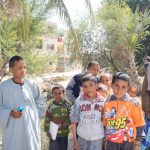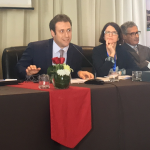Egypt introduced the Takaful and Karama Program (TKP), a pair of targeted cash transfer schemes in March 2015. Takaful and Karama was designed as a conditional cash transfer program providing income support targeted to the poor and most vulnerable; namely poor families with children (under 18 years of age), poor elderly (aged 65 years and above) and persons with severe disability.
Opportunity: Consultant for Takaful and Karama Round 2 Evaluation
IFPRI-Egypt is seeking to hire a survey firm to work as a Consultant for Takaful and Karama Round 2 Evaluation.
Application Deadline: April 9, 2021
IFPRI Podcast Research Talks with IFPRI: The Power of Safety Nets in Egypt
Egypt’s Minister of Social Solidarity and Social Protection Nivine El-Kabbag with IFPRI researchers Clemens Breisinger and Hoda El Enbaby share the story of IFPRI’s collaboration with the government of Egypt to evaluate the country’s first national conditional cash transfer program [...]
A Call for Evidence-based and Sustained Action for Improving Nutrition in Egypt
Aula Ali - IFPRI Egypt office intern
Habiba Hassan Wassef - Health and Nutrition Policy in Sustainable Development Researcher, National Research Center
Sahar Zaghloul - Vice President, National Nutrition Committee
Clemens Breisinger - IFPRI Egypt Country Program Leader
What are the recommended actions for supporting the 100 million Healthy Lives initiative: based on the existing data and research and on experts and policy makers that attended the joint IFPRI Egypt - NNC seminars, the following actions are recommended: [...]
News: Investing in Evidence to End Hunger: A Closer Look at National Opportunities
New evidence continues to signal a rise in world hunger and a reversal of trends after a prolonged decline. In 2017, the number of undernourished people is estimated to have increased to 821 million – around one out of every nine people in the world. The alarming signs of increasing food insecurity and high levels of different forms of malnutrition are a clear warning that there is considerable work to be done to make sure we “leave no one behind” on the road towards achieving SDG 2. Achieving it requires renewed efforts through new and innovative ways of working and hinges on effective partnership.





